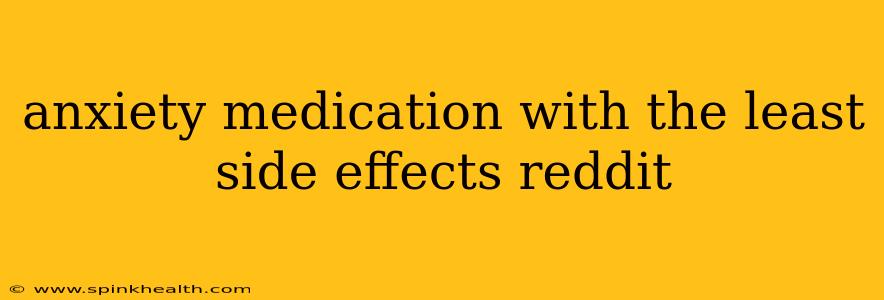The Quest for Calm: Finding the Right Anxiety Medication with Minimal Side Effects
Anxiety. That gnawing feeling in your stomach, the racing heart, the overwhelming sense of dread. It's a battle many face, and finding the right medication to manage it can feel like searching for a needle in a haystack. The internet, especially Reddit, is flooded with discussions about anxiety medication, often focusing on side effects. This is completely understandable; no one wants to trade one problem for another. This journey of finding the right medication is personal, and what works wonders for one person might not work for another. However, we can shed light on some common approaches and considerations based on extensive research and user experiences found across various online forums, without providing specific medical advice.
This isn't a prescription, just a guide to help you navigate conversations with your doctor. Remember: Always consult with your physician or psychiatrist before starting or stopping any medication. They can assess your specific needs, medical history, and other factors to determine the best course of action for you.
What are some common anxiety medications?
The landscape of anxiety medications is diverse, with different classes of drugs offering varying mechanisms of action. Some common types include:
-
Selective Serotonin Reuptake Inhibitors (SSRIs): These are frequently prescribed for anxiety and depression. They work by increasing the levels of serotonin in the brain, a neurotransmitter associated with mood regulation. Examples include sertraline (Zoloft), escitalopram (Lexapro), and fluoxetine (Prozac).
-
Serotonin-Norepinephrine Reuptake Inhibitors (SNRIs): These medications affect both serotonin and norepinephrine, another neurotransmitter involved in mood and alertness. Venlafaxine (Effexor) and duloxetine (Cymbalta) are examples.
-
Benzodiazepines: These are often used for short-term relief of anxiety symptoms due to their fast-acting nature. However, they carry a higher risk of dependence and are generally not recommended for long-term use. Examples include alprazolam (Xanax) and lorazepam (Ativan).
-
Buspirone: This medication works differently than SSRIs and SNRIs and is often considered to have a lower risk of side effects. However, it takes longer to become effective.
What anxiety medication has the least side effects?
This is a question frequently asked on Reddit and other online forums, but there's no single "best" answer. The experience of side effects is highly individual. What causes minimal discomfort for one person might be debilitating for another. Some people find SSRIs relatively well-tolerated, while others experience significant side effects. The same is true for all classes of medication.
What are the common side effects of anxiety medication?
Common side effects can include:
- Nausea: This is a frequent side effect, often lessening over time.
- Headaches: Many people experience headaches, particularly in the initial stages of treatment.
- Drowsiness: This varies greatly depending on the medication and the individual.
- Sexual side effects: Reduced libido, difficulty achieving orgasm, and erectile dysfunction are possible side effects of some medications, particularly SSRIs.
- Weight changes: Some medications can lead to weight gain or loss.
- Insomnia or sleep disturbances: While some medications can cause drowsiness, others can lead to insomnia.
How long does it take for anxiety medication to work?
The time it takes for anxiety medication to become effective varies depending on the individual, the medication, and the dosage. Some medications may provide noticeable relief within a few weeks, while others may take several months to reach full effectiveness. It's crucial to work closely with your doctor to monitor your progress and adjust your treatment plan as needed.
Are there any natural alternatives to anxiety medication?
While medication can be highly effective for managing anxiety, some people explore natural alternatives such as:
- Therapy: Cognitive Behavioral Therapy (CBT) and other forms of therapy can be incredibly helpful in addressing the underlying causes of anxiety.
- Lifestyle changes: Regular exercise, a healthy diet, sufficient sleep, and stress-reduction techniques like yoga and meditation can all contribute to better anxiety management.
Disclaimer: This information is for educational purposes only and should not be considered medical advice. Always consult with your healthcare provider before starting or stopping any medication, including anxiety medication. They can help you make informed decisions based on your individual needs and medical history. Online forums, while providing valuable insights from personal experiences, should not replace professional medical advice.

